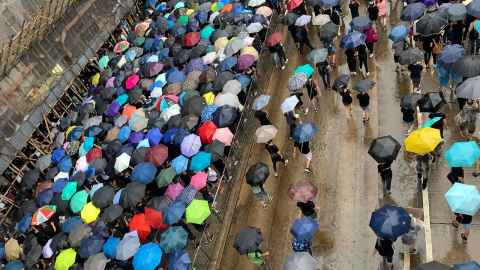What now for Hong Kong?
09 December 2019
Opinion: A landslide for Hong Kong democracy candidates in local elections shows the protesters have public support. But, writes, Joseph Miller, a democratic, independent Hong Kong is not an option.

Sunday’s elections represented a big win for Hong Kong’s democracy protesters. They have shown the world (and Beijing) that despite increasing violence, the movement itself still commands widespread support among the electorate, and they have taken a step towards greater power within the government.
However, people looking on must be cautious about their expectations and what can realistically be achieved by the protests, even with the recent election results. Let’s take a brief look at how we arrived at this point and some possible outcomes. Spoiler alert: an independent, democratic Hong Kong is not one of them.
Beginning with the protesters, the movement started in response to a now-withdrawn Extradition Bill, allowing for criminal suspects to be extradited to mainland China (and Taiwan). There were fears Beijing would subject people to arbitrary detention and take them to the mainland for political purposes, stemming in part from previous incidents of this happening in 2015.
While the bill is now dead – it was introduced in April and withdrawn in October – this happened several months after the start of the demonstrations, which have since morphed into a general protest against Beijing’s creeping influence in Hong Kong, solidifying around the now-famous Five Demands: The withdrawal of the Extradition Bill; for the protests not to be characterised as “riots”; amnesty for arrested protesters; an independent inquiry into allegations of police brutality and implementation of complete universal suffrage
Essentially, the remaining demands boil down to a sort of general amnesty and reconciliation with the protesters by the Hong Kong government, as well as the realisation of universal suffrage in the city, a goal specifically stated in the Basic Law (Hong Kong’s governing document).
Currently, only half of the Legislative Council is directly elected; the remainder is elected by functional constituencies, economic and occupation-based interest groups, and the Chief Executive is elected by a 1200-member Election Committee comprised of these and other interest groups. While voices for complete independence and resentment towards Beijing’s influence are present, at least in terms of the specific demands, the protesters have so far tempered these less-pragmatic views.
And with the recent recession in Hong Kong, it is possible that Beijing may decide that temporary international condemnation is worth it to put an end to the protests.
But what of Beijing? As yet, China appears to be taking a somewhat hands-off approach. After all, this was a successful strategy in the previous Umbrella Movement protests in 2014: Beijing refrained from using force and conceded a proposed bill that would have allowed direct elections as long as it vetted the available candidates, but it also steadfastly refused to allow true universal suffrage.
The protests eventually died down and China avoided the sort of international backlash it had faced following Tiananmen. However, this is a calculation for China’s government; whether the turmoil from the protests or the backlash from forced suppression would hurt its interests more.
And with the recent recession in Hong Kong, it is possible that Beijing may decide that temporary international condemnation is worth it to put an end to the protests. As horrified as many countries may be, none are likely to intervene militarily, nor can they afford to economically sanction China indefinitely.
So what is likely to happen now? Independence can be ruled out immediately; China will never allow a city it considers so integral to its territorial integrity to secede, and the world has legally recognised Hong Kong to be a part of China. I would argue that true universal suffrage can also be ruled out, as China has made it clear in the past (both on handover and in the 2014 protests) that it will not allow for true democracy outside of its control.
While some concessions have previously been made since handover, these have largely occurred with Beijing setting both the pace and extent of permissible reform. It is therefore unlikely that China would concede and grant the protesters’ fifth demand.
However, the other three remaining demands have a bit more leeway, as long as Beijing continues its mostly hands-off approach to Hong Kong internal matters. The key determiner then becomes how stringently the protesters define each.
The second, for example, demands that the protests not be characterised as “riots.” Mainland Chinese media are unlikely to change on this point, as the depiction of the protests as both violent riots and driven by foreign interference are essential elements of Beijing’s media strategy.
However, recognition of the protesters’ legitimate grievances and demonstrations could be granted by the Hong Kong government, which also has the power to decide on the third and fourth demands. But this would require some form of negotiation, and the current entrenchment of both sides makes the prospect seem dim.
Ultimately, three potential paths lie before Hong Kong. The protests could follow the 2014 model, dying down and being handled internally without China’s intervention, achieving the initial goal of withdrawing the extradition bill and little else. Beijing could decide the turmoil and economic loss is no longer worth preventing international backlash, and suppress the protests by force if they continue.
Or a negotiated outcome could be achieved, with each side making concessions on the Five Demands. In recognition of both the legitimate grievances voiced by the protesters and the danger posed by escalating violence, I sincerely hope they choose the third.
Joseph Miller is a PhD student in Asian Studies in the Faculty of Arts.
This article reflects the opinion of the author and not necessarily the view of the University of Auckland.
It was first published on Newsroom What now for Hong Kong? 28 November, 2019.
Media contact
Julianne Evans| Media adviser
Mob: 027 562 5868
Email: julianne.evans@auckland.ac.nz